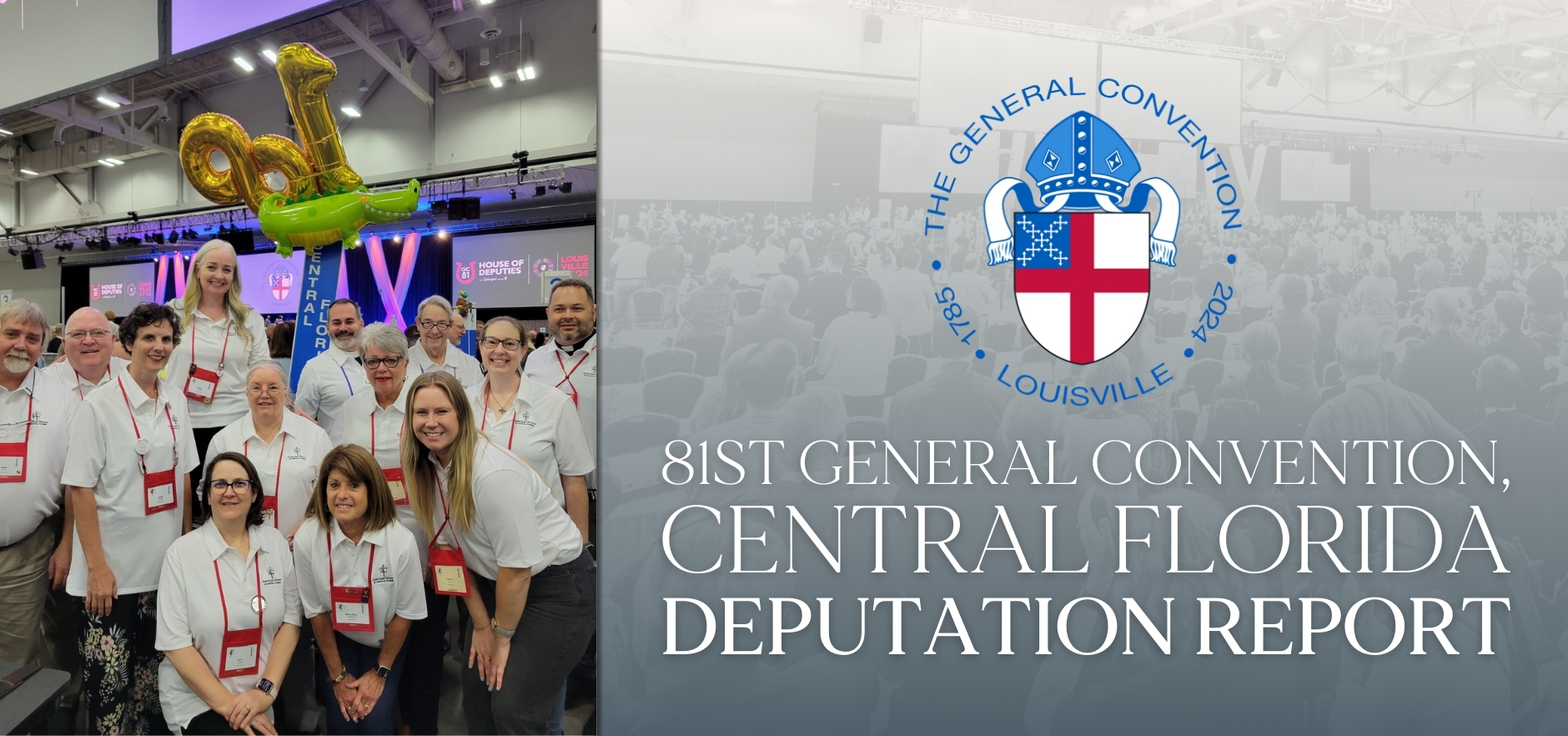
The Central Florida deputation to the 81st General Convention of The Episcopal Church, held June 23-28 in Louisville, Kentucky, helped make history by electing and confirming the Rt. Rev. Sean W. Rowe as the church’s 28th presiding bishop. However, this significant decision was far from the only way the diocesan bishops and deputies contributed to the GC81 effort. This report sets forth GC81 happenings with particular impact on the Diocese of Central Florida and includes comments from bishops and deputies in attendance.
In addition to the Rt. Rev. Dr. Justin S. Holcomb, diocesan bishop, who also served as secretary for the Committee on Formation and Discipleship, and the Rt. Rev. Dabney Smith, assisting bishop, members of the Central Florida deputation, listed with their churches and any committees on which they served, were as follows:
Clerical Order: The Rev. Phyllis Bartle, St. Jude’s, Orange City, deputation leader and member, Evangelism and the Future Church; the Rev. Scott Holcombe, Christ Church, Suntree-Viera; the Rev. Sara Oxley, Good Shepherd, Maitland, member, Ecumenical and Interreligious Relations; the Rev. Dr. José Rodríguez, Christ the King and Jesús de Nazaret, Orlando. Alternates: the Rev. Laura Cook, All Saints, Winter Park; the Very Rev. Deke Miller, Holy Cross, Winter Haven; the Rev. Kay Mueller, Church of Our Saviour, Okeechobee.
Lay Order: Mrs. Emily Fletcher, St. Peter’s, Lake Mary; Mrs. Mary Kay Predmore, Church of the Messiah, Winter Garden; Mrs. Heather Rodríguez, Christ the King, Orlando, secretary, World Mission; Mrs. Heidi White, Holy Cross, Winter Haven, assistant secretary, Accessibility and Inclusion.
“It is very clear to me that in this gathering is indeed the breadth of the church,” said Holcombe as GC81 began. “It is obvious from the official youth presence, to the translators in several different languages, to the inclusion of ethnic diversity and expansive language in the liturgy and diversity of music in song that we are a very diverse church!”
“I believe our deputation reflects a range of experience, ages, interests, personal history and viewpoints,” said White, a first-time deputy. “As deputies, we are free to vote based on our personal convictions (“our hearts”). I believe we share the goal of keeping the work of God in the world first and foremost. All of us, deputies and alternates alike, are eager and willing participants in the process that is the General Convention, which will shape the future of The Episcopal Church.”
Election of Presiding Bishop: ‘Strong and Effective Witness to the Gospel’
Rowe, elected and confirmed June 26 on the first ballot from a field of five nominees, is set to succeed the Most Rev. Michael B. Curry, current presiding bishop, upon his Oct. 31 retirement. The presiding bishop-elect currently serves as bishop of the Diocese of Northwest Pennsylvania and bishop provisional of the Diocese of Western New York. He holds a Ph.D. in organizational leadership and has been an advocate for streamlined church governance. At 49, he is the youngest presiding bishop ever elected to the role; he was only 32 when he became bishop and, for the next 12 years, remained the youngest bishop in The Episcopal Church. More importantly, he is a powerful advocate for the gospel.
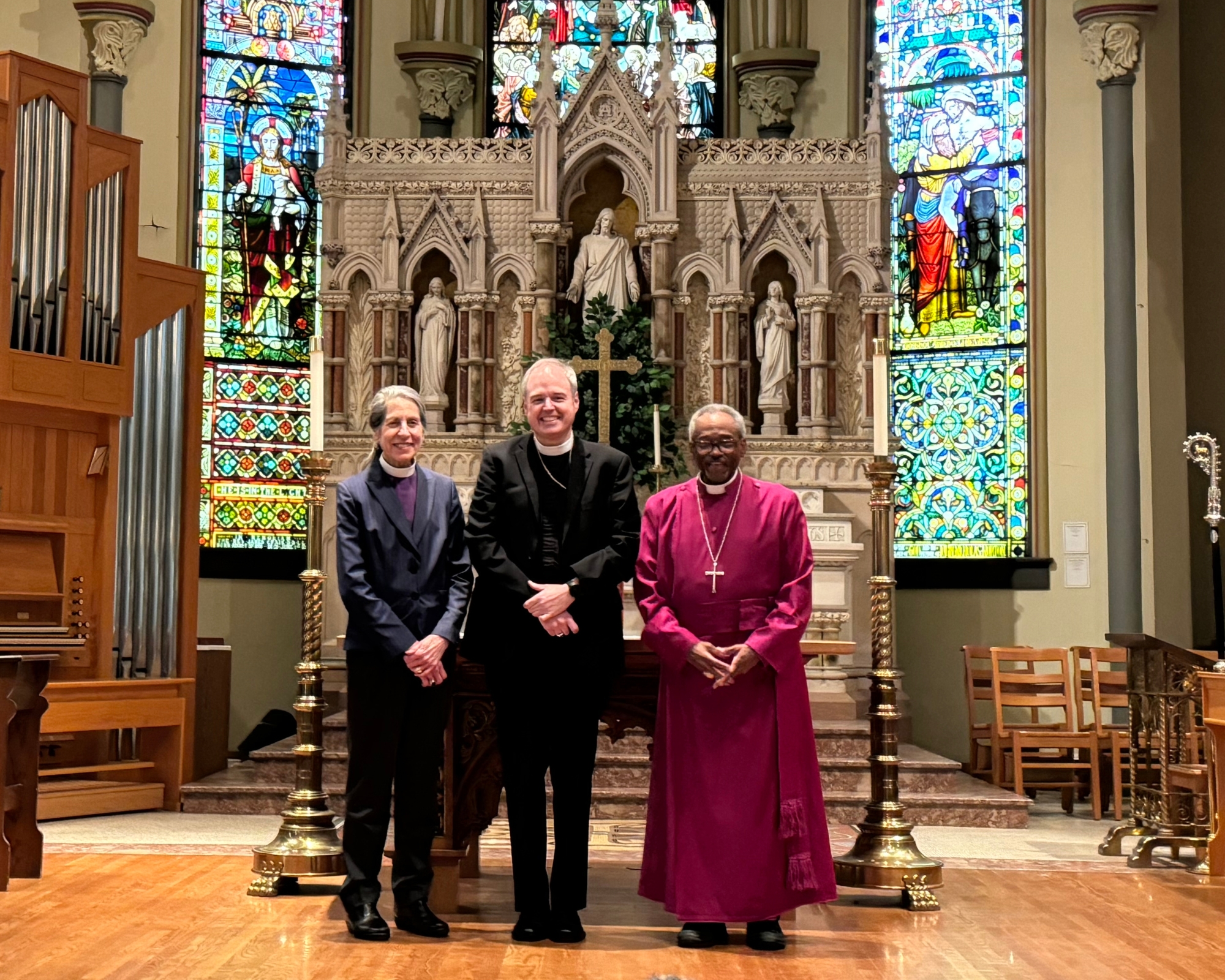
Past Presiding Bishop Katharine Jefferts Schori, Presiding Bishop-Elect Sean W. Rowe and current Presiding Bishop Michael B. Curry celebrate Rowe’s election and confirmation. | Photo: Courtesy GC81 DCF deputation
In his post-confirmation address to bishops, deputies and guests in the House of Deputies, Rowe compared the challenges addressed by the two dioceses he currently leads to those facing The Episcopal Church. “I believe that the kind of collaboration and experimentation we are up to can help us ensure the strong and effective witness to the gospel of Jesus Christ and to bring The Episcopal Church into the future to which God is calling us,” he said.
Diocesan deputies and bishops alike celebrated his election and resonated with his gospel emphasis. Smith, who said Rowe is both “colleague and friend,” described the bishops’ shared walk to the Cathedral for his election as a “holy, stimulating event.”
Holcomb saw the choice of Rowe as “exciting and encouraging,” pointing out his “unwavering commitment to proclaiming the gospel of Jesus Christ.”
Both Holcomb and Bartle highlighted the presiding bishop-elect’s emphasis on the church’s need to change. “He said the church must reorient resources (budgets and staff) in order to support dioceses and parishes,” Bartle explained. “This will mean a reform of structure and governance where we support the good work already being done.”
“Our ministry together in the next nine years comes at a critical time for The Episcopal Church,” Rowe said in his address. “It is not too strong to say that we’re facing an existential crisis. Not because the church is dying, or because we have lost our belief in the salvation of God in Jesus Christ. But because as the world around us changes, and continues to change – it changes all the time – and God is calling us more deeply into the unknown.”
Yet Rowe’s focus on transition did not supersede his kingdom focus. “Reorienting our structures, our budgets and our relationships will only matter if we do it for the sake of the gospel, for the sake of Jesus Christ,” he said later in the address. “And it will be no good unless we do all for the gospel.”
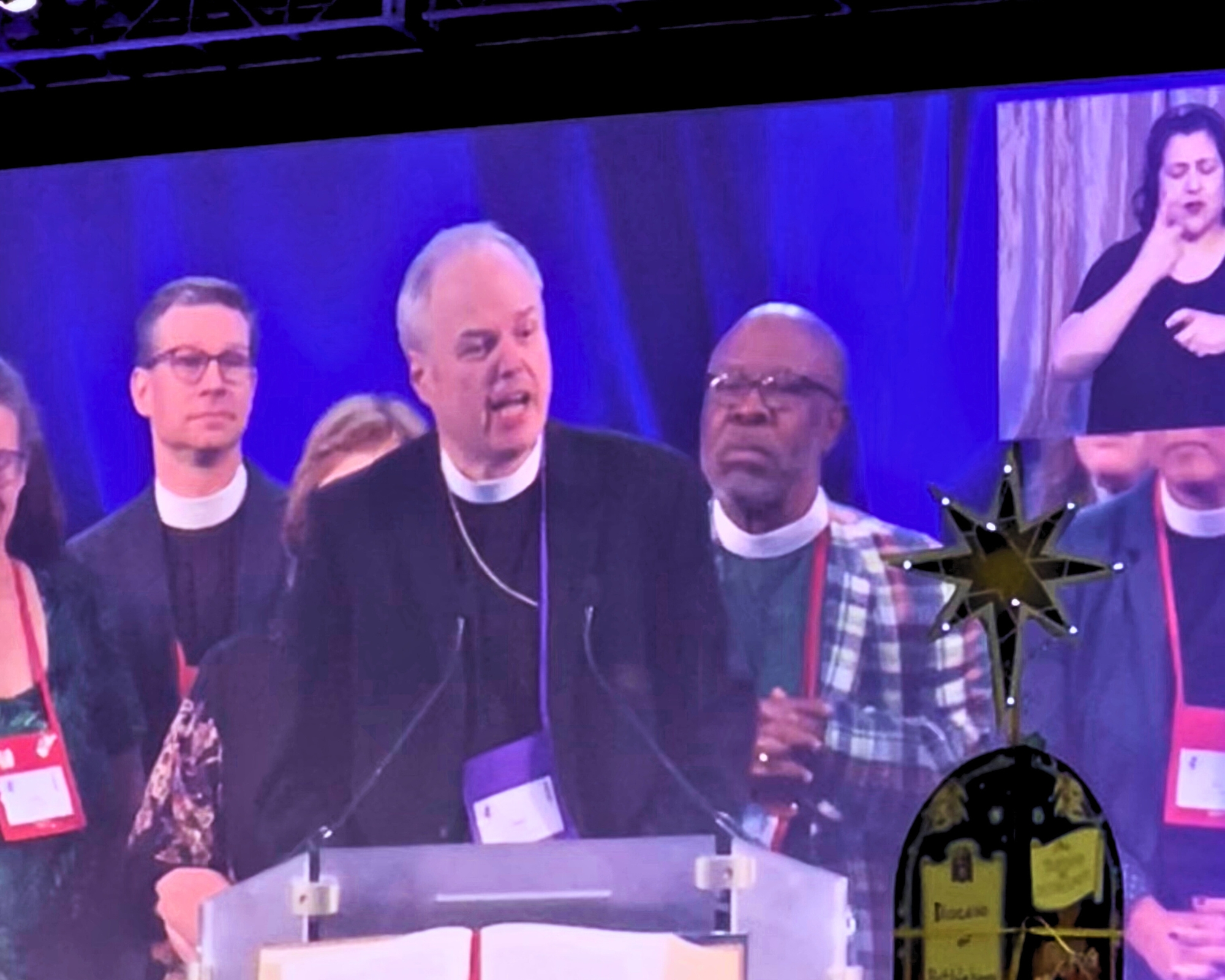
Presiding Bishop-Elect Sean W. Rowe gives his post-confirmation address in the House of Deputies. | Photo: Courtesy GC81 DCF deputation
The presiding-bishop elect also emphasized “collaboration between dioceses and fostering a sense of community even amid disagreements,” all for the sake of the gospel, Holcomb said, noting that Rowe’s address contained themes of evangelism, racial reconciliation and creation care; leadership and resilience; forgiveness and reconciliation; and confronting idolatry and structural change.
“These themes underscore a vision of a dynamic, responsive and unified church dedicated to its core mission despite challenges,” the Central Florida bishop said.
“It was an honor to be present as history was being written,” Mueller said of Rowe’s election. “Just as our diocesan bishop was elected on the first ballot by a substantial majority in January 2023, today we witnessed our next presiding bishop elected on the first ballot by a substantial majority. … It is obvious Presiding Bishop-Elect Rowe has a plan, and we move forward with hope in our future at all levels of the church: local, diocesan and national.”
Rowe stressed the primacy of gospel proclamation during his sermon at the closing Eucharist on June 28. “We are not backing down in our proclamation of the gospel,” he said. He also emphasized the importance of various segments of the denomination speaking the truth: “We must learn to have hard conversations with each other, with love and respect, so that we’re all pulling in the same direction: the transformation of the world by the gospel of Jesus Christ.”
Cook said Rowe’s sermon was “wonderful,” describing it as “full of humor and pointing us all to the gospel.” She added that “He accurately spoke about the desire of working in Beloved Community, calling us to collaborate because, as he said, ‘If we can’t figure it out in here [within the church], how are we supposed to carry it out to the world?'”
Rowe will be installed Nov. 2 at the denominational headquarters in New York City in a simple service available via livestream, accommodating his desire to “care for God’s creation by reducing our collective carbon footprint,” he said in a press release.
But the vote on a new presiding bishop was not the only significant election held during the Convention. On June 25, the day before Rowe’s election, House of Deputies President Julia Ayala Harris of the Diocese of Oklahoma was reelected on the first ballot to her second term and first three-year term; she was first elected in 2022 at the 80th General Convention, which was delayed a year by the COVID-19 pandemic. On June 26, the House of Deputies elected the Rev. Dr. Steve Pankey of the Diocese of Kentucky as its vice president on the second ballot.
On June 28, the House of Bishops elected the Rt. Rev. Jennifer Baskerville-Burrows, bishop of the Diocese of Indianapolis, as its vice president. Her tenure will begin with Rowe’s on Nov. 2. “Jennifer was a strong selection,” Smith said. “She is also my son’s bishop.”
Legislative Matters: Key Topics
The real work of every General Convention is done through its bicameral legislature: the House of Bishops and the House of Deputies, including that done months and even years before the Convention by various committees. Bishops and deputies vote on resolutions, which are proposed actions or decisions.
“In total during this Convention, we dealt with nearly 500 resolutions,” Bartle said. Only the most significant to the Diocese of Central Florida and its deputation are discussed here; please visit this link for further information on legislative action, and plan to attend the Aug. 6 General Convention Q&A for additional discussion of the work of the Convention.
New deputies, both clergy and lay, took time alongside more experienced deputation members to learn about the Convention process itself as well as any legislation. “As a deputy, becoming oriented to the rules, iPad with calendars, resolutions and binder was so important,” Fletcher said. “There was a bit of a learning curve as to when we would debate certain items and where to find information about the resolutions. I had to become acquainted to the consent and legislative calendars and prepare ahead of time to speak to different topics.”
“Each of the deputies and alternates is taking the time outside of the legislative times to talk through the consent calendar and the resolutions, which seems like a no-brainer but has been very helpful to me as a first-time member of the Convention,” Miller explained during GC81. Because several deputies had to drop out, there were no alternates in the lay order, but three alternates from the clerical order attended, the others at times yielding their place on the floor so the alternates could gain experience.
Prayer Book Memorialization
Decisions regarding the Book of Common Prayer stood as some of the most significant decisions of GC81 overall and for the Diocese of Central Florida. By wide margins, canons were passed that define “memorialization,” stating that any memorialized prayer book is “authorized for continual use,” and that the version of a Book of Common Prayer in place at the time of memorialization is the one memorialized.
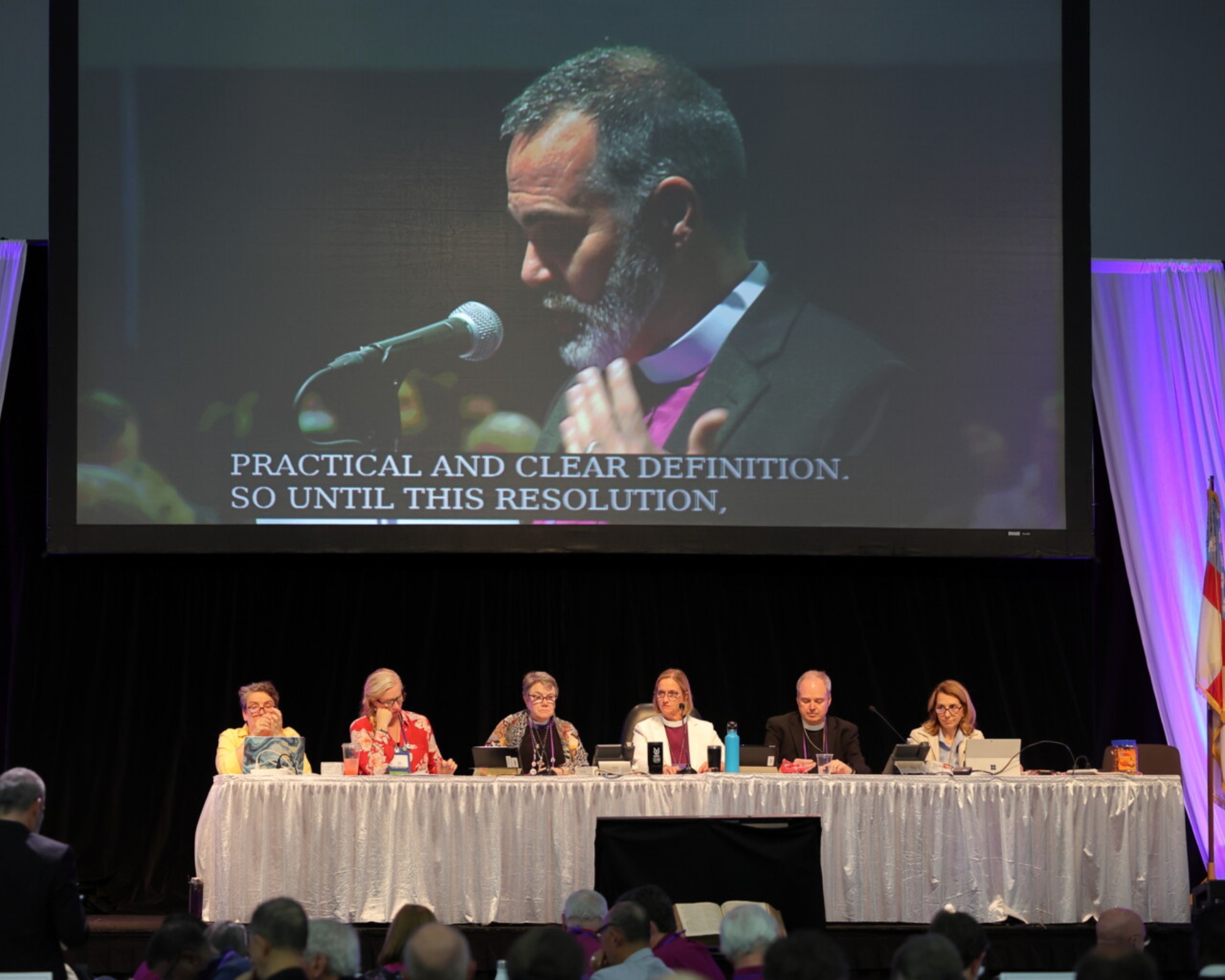
Bishop Justin Holcomb addresses the House of Bishops. | Photo: Asher Imtiaz for The Living Church
The Diocese of Central Florida took its place in the councils of The Episcopal Church on this issue via Holcomb, who spoke at the microphone three times, twice about a constitutional change, A224, as related to Article X (Memorialization). “I am witness to the steady and clear emergence of the leadership of our Bishop Justin on the floor of the House of Bishops,” Smith said.
“This [A224] seems to be the culminating work started in 2018,” Holcomb said on the floor of the House of Bishops. “As a deputy in the House of Deputies, I worked on supporting B012 and A068. In 2018 the issue of memorialization was highlighted. … We had a flexible word like ‘memorialize’ that needed a practical and clear definition. So, until this resolution, ‘memorialization’ has remained (to me) undefined.”
Because it has now been memorialized, the current (1979) edition of the Book of Common Prayer is authorized for use now and in perpetuity.
“This definition seems to be what was intended by A068 in 2018, when it resolved: ‘That this Convention memorialize the 1979 Book of Common Prayer as a Prayer Book of the church preserving the psalter, liturgies, The Lambeth Quadrilateral, Historic Documents, and Trinitarian Formularies ensuring its continued use,'” Holcomb told his fellow bishops.
Also approved at GC81 was the first reading of a constitutional amendment that adds the language of prayer book memorialization to the church constitution, giving the concept of prayer book authorization more significant authority and making it more difficult to displace.
Marriage
The addition of gender-neutral rites to the Book of Common Prayer was approved for trial use in 2018, a process which continued at GC81 with approval of the first reading of Resolution A116. More than one deputy counted this as the single most important experience of that legislative day, June 27.
If passed on a second reading at GC82 in 2027, the prayer book will include both the existing marriage rite, to be renamed “Celebration and Blessing of a Marriage I,” and a new rite, to be named “Celebration and Blessing of a Marriage II.” Thanks in part to the work of the Task Force for Communion Across Differences, of which Bartle was a member, the resolution maintains and preserves the traditional marriage rite rather than replacing it.
In addition, “B008 clarified some confusion about how trial use and the two readings should be understood,” Holcomb said in his remarks to the House of Bishops. “It [the addition of new liturgy] is now understood to be trial use plus first reading plus second reading,” with readings coming at each General Convention.
Creation Care
Creation care was the dominant issue for 30 deputies and bishops commenting at a 90-minute joint session on the church’s budget on June 24.
This topic, already important to the Diocese of Central Florida, became even more personal when the Rt. Rev. Lloyd Allen, bishop of its longtime Companion Diocese, The Diocese of Honduras, spoke out in the House of Bishops and in the General Session on behalf of including Province IX in its discussion of the issue. His remarks were an appeal not only on behalf of the need to address climate change, but for inclusivity and respect.
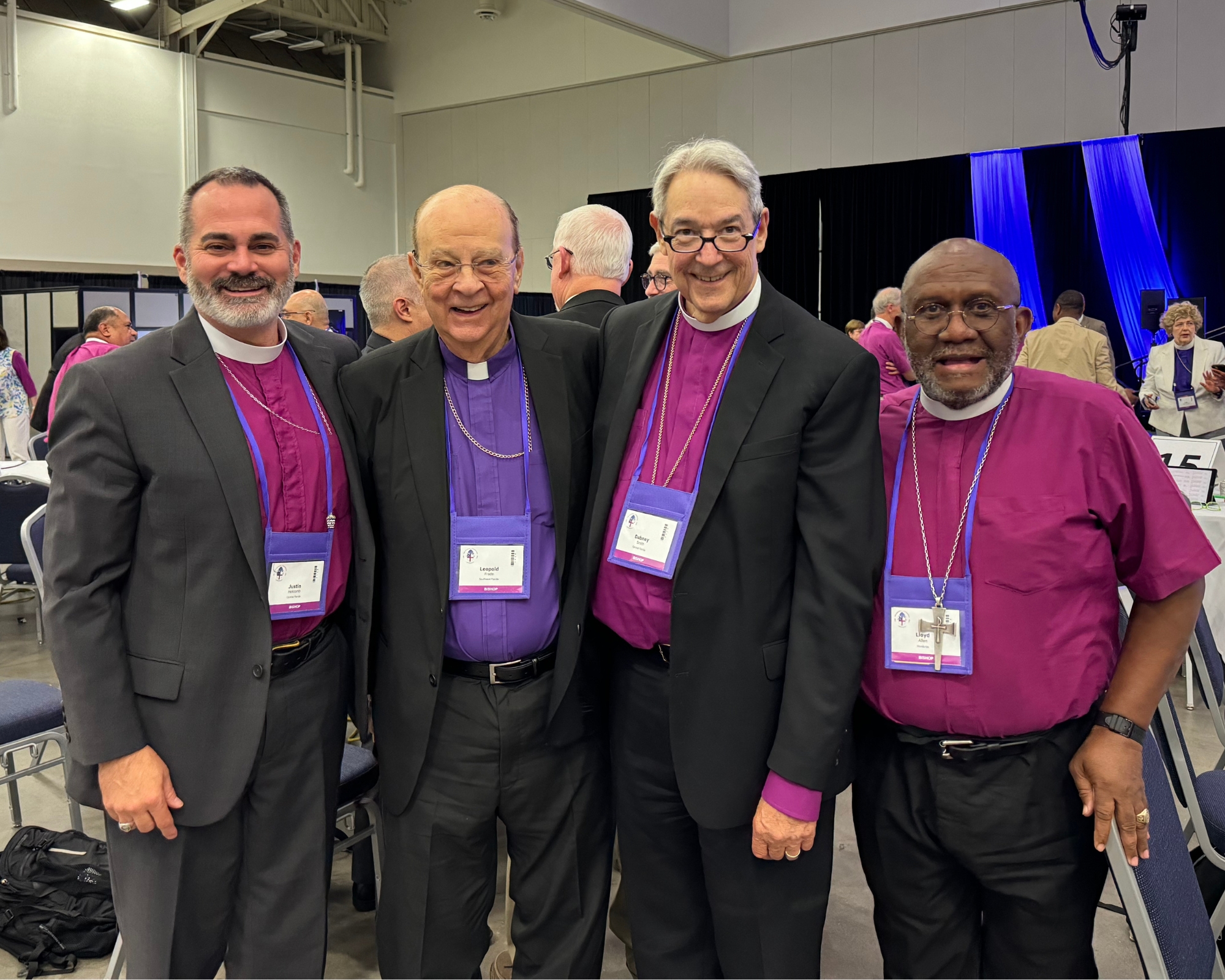
Central Florida Bishop Justin Holcomb, Southeast Florida Bishop Leo Frade, Central Florida Assisting Bishop Dabney Smith, Honduras Bishop Lloyd Allen | Photo: Courtesy GC81 DCF deputation
“During my remarks to the House of Bishops, I continually called attention to the way the laity, clergy and bishops of Province IX are treated,” Allen said after GC81. “For 22 years, I have been fighting against the lack of proper translation, equality and respect. Despite the Episcopal Church’s slogan, ‘The Episcopal Church Welcomes You,’ we are often looked down upon.
“This church is not just a national church but an international one,” he stressed. “We can no longer be treated as inferior members. In John 17, we are called to be one and to love each other unconditionally. Even though it is tiring, as long as I can and continue to be a part of this church and the House of Bishops, I will stand at microphones claiming what is rightfully ours. I will not give up until Province IX is recognized and treated with dignity and respect.”
Initially, it appeared as though DO50, Resolution to Complete the Journey to Net Carbon Neutrality by 2030, which included an allocation of $225,000 for staffing to develop and manage a resource hub for creation care, would be rejected, Holcomb said. However, he added, “our partner bishop went to the mat.”
Allen stood and made a strong appeal, eventually inviting the other Province IX bishops to stand in solidarity behind him as he made a case for the resolution to pass and for Province IX to receive an additional $90,000 ($30,000 annually for three years) to support this work. Despite some dissension, the vote to approve the amended resolution with its additional funding was unanimous. “His comments shifted everything,” Holcomb said.
The Honduras bishop’s concern for inclusion of Province IX in this discussion arose not simply for the need for equity but because of the impact of climate change on this part of the world, in particular as regards the ability to carry out its mission of spreading the gospel.
“Climate change has had a profound impact on the Dioceses of Venezuela, Ecuador, Colombia, Honduras and the Dominican Republic,” Allen said. “We have witnessed and experienced more frequent and severe hurricanes, flooding and droughts, which have devastated communities and disrupted lives. These environmental challenges make it difficult for us to carry out our mission, as resources are diverted to emergency response and recovery efforts.
“However, we remain committed to spreading the gospel and supporting our communities through resilience-building initiatives and sustainable practices,” he added. “We asked to be included in one of the regions with a staff person to oversee creation care projects in Province IX.”
Title IV Decisions
Title IV of the canons (laws) of The Episcopal Church sets out standards for those ordained in the church by addressing the grounds and processes for ecclesiastical discipline, defined by The Episcopal Church as “a canonical process adopted by the Church to encourage accountability, reconciliation, and pastoral response when a member of its clergy (deacons, priests, or bishops) is accused of misconduct.” On June 26, the House of Bishops passed a series of resolutions to amend these canons, including a resolution designed to prevent conflicts of interest in receiving complaints.
The bishops also approved an amended version of Resolution AO53, requiring every diocese to have at least one Title IV intake officer who is not directly employed or otherwise compensated by the diocese in which the matter is pending. This change is intended to help prevent perceived or real bias by the intake officer.
Resolution AO52, which amends the canons by offering a Restorative Covenant as one possible result of conciliation in the Title IV process, also received the bishops’ approval. This provision could potentially avoid unnecessarily escalating a matter to a hearing panel or mediation.
In addition, the House of Bishops passed Resolution D053. Seeking to address the issue of churchwide disciplinary board vacancies lasting months and even years, it requires that those positions be filled within 60 days.
The bishops also passed two additional Title IV-related resolutions, AO57, dealing with suspension of a bishop, and A147, dealing with how to address lay officers facing credible allegations of misconduct.
Women in Ministry
With a high number of women among its ranks, the Central Florida deputation took special interest in Resolution A188, “Celebration of the 50th Anniversary of the Philadelphia Eleven” passed on June 27. The Philadelphia Eleven are the first 11 women ordained in The Episcopal Church, on July 29, 1974. White noted that “This afternoon, our deputation was all female.”
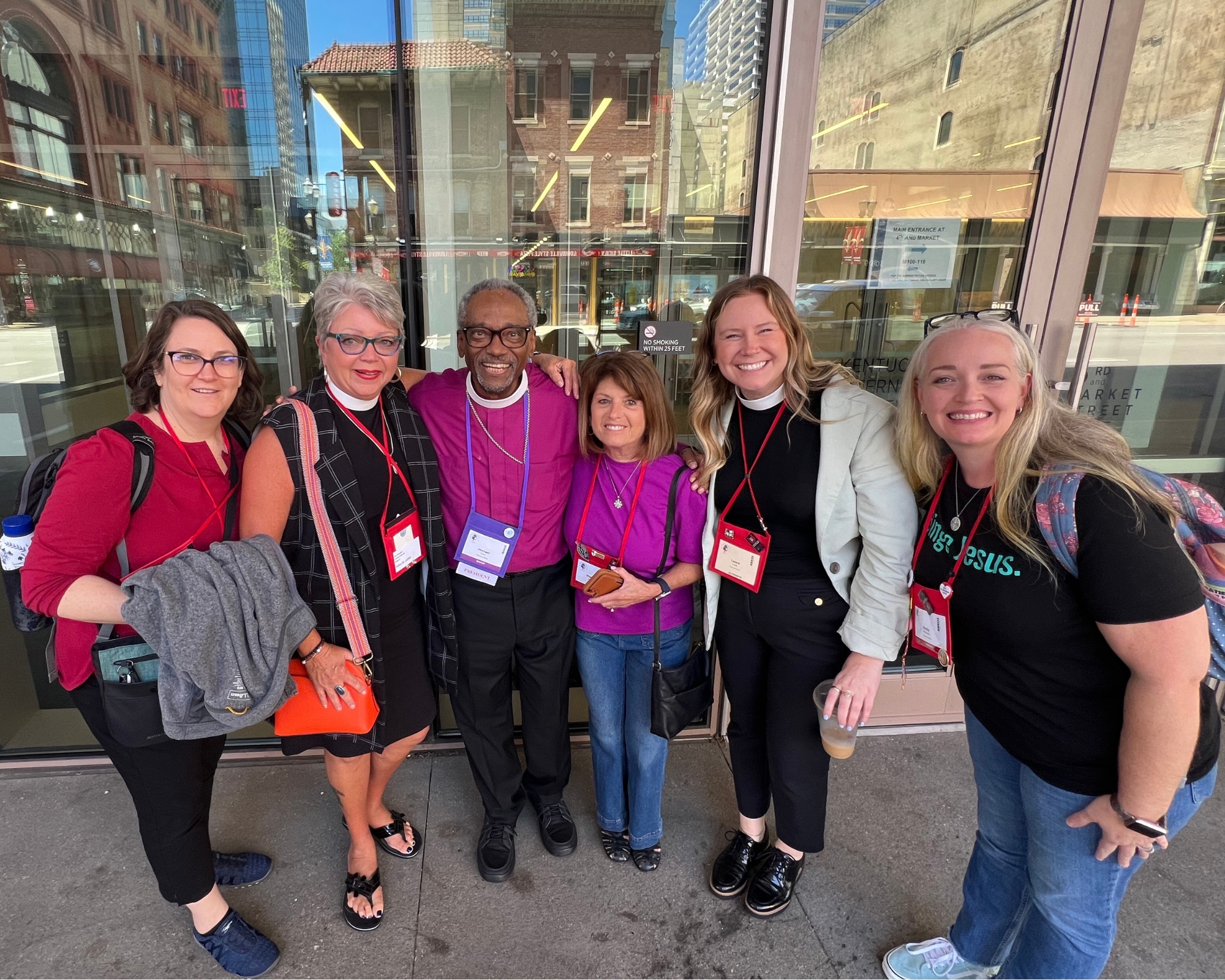
Presiding Bishop Michael B. Curry with some of Central Florida’s dynamic female leaders, L-R, Rev. Sara Oxley, Rev. Kay Mueller, Mrs. Mary Kay Predmore, Rev. Lo Cook and Mrs. Emily Fletcher | Photo: Courtesy GC81 DCF deputation
“There was a large Bible open in front of the podium turned to Numbers 26:33 (five daughters named in the census),” Bartle said. “The significance was the honoring of the Philadelphia Eleven and the fact that there are now so many women in leadership in the church.”
“Celebrating the 50th anniversary of the Philadelphia Eleven and looking around the room to see all the female clergy who would not have been able to participate before the action of the Philadelphia Eleven was powerful,” Cook said. “It was an emotional moment to have all the female clergy standing and see the impact these women had, allowing all of us to be here, following the call of God on our lives.”
Mueller also had a visceral response to the anniversary celebration, saying it was “emotionally moving for me as a woman ordained to priesthood in The Episcopal Church. The words ‘shattering the glass ceiling’ were used in the presentation of the resolution, and that resonated deeply with me. Throughout history, many noble, brave and determined women have paved the way for issues and opportunities that have positively impacted our world. This encompasses women of the Bible, including but not limited to Shiphrah, Puah, Miriam, Deborah, Abigail … and the list goes on. Hallelujah!”
Diocese Impacts Broader Episcopal Church
Because of committee work and other denominational responsibilities, the diocesan deputation and bishops made an impact long before resolutions came to the floor. White described the process:
As a first-time deputy, I did not know what to expect and there was so much to learn. Prior to General Convention, I tried to educate myself as much as possible. I attended the orientations and several committee meetings via Zoom. Every day was a learning experience.
In trying to explain it to others, I have compared the House of Bishops to the U.S. Senate and the House of Deputies to the U.S. House of Representatives. The House of Deputies had over 800 deputies representing 109 dioceses, plus alternates, media and visitors. … It is remarkable the amount of work that took place in the months leading up to Convention. There were more than 20 committees that heard testimony and considered the resolutions. The ability of the respective committee to take the time to examine each resolution and hear testimony is invaluable.
Depending on the resolution before us, we, in the House of Deputies have heard very emotional and personal testimony. It is remarkable to witness the courage of those testifying, especially in such a large forum. Although we were not permitted to publicly react (by applause, etc.), I sensed the deputies truly listened and truly cared. There was a palpable sense of respect.
Oxley, also a first-time deputy, was one of those whose committee work made an impact. The committee on which she served, Ecumenical and Interreligious Relations, began meeting back in March 2024. During GC81 at one of the committee meetings, “I made a motion to approve a resolution condemning antisemitism,” she said. “It went well until someone said it needed to define ‘antisemitism.’
“We took a 10-minute break,” she continued. “The writers were frantic, trying to find a definition. … I said, ‘I made the motion. I will withdraw my motion, and someone can table it until our next meeting. … The group was able to work on it overnight, and they drew up a fantastic resolution. The committee then went through it, cleaned it up and discussed it. I made some changes to it. They used the Church of England’s definition!” Oxley was thrilled that her high school experience with parliamentary procedure stood her in good stead.
The House of Bishops later approved the resolution as amended, and the House of Deputies voted to concur. Check out DO59, “Addressing Antisemitism in the Church and World,” at this link if you’d like to know more.
Later, the same committee worked on a resolution combating anti-Muslim bias, DO78. “It is great to see the group working together and excited to address this!” Oxley said. “It has been a great group of people to work with.” D078 was also approved by both houses.
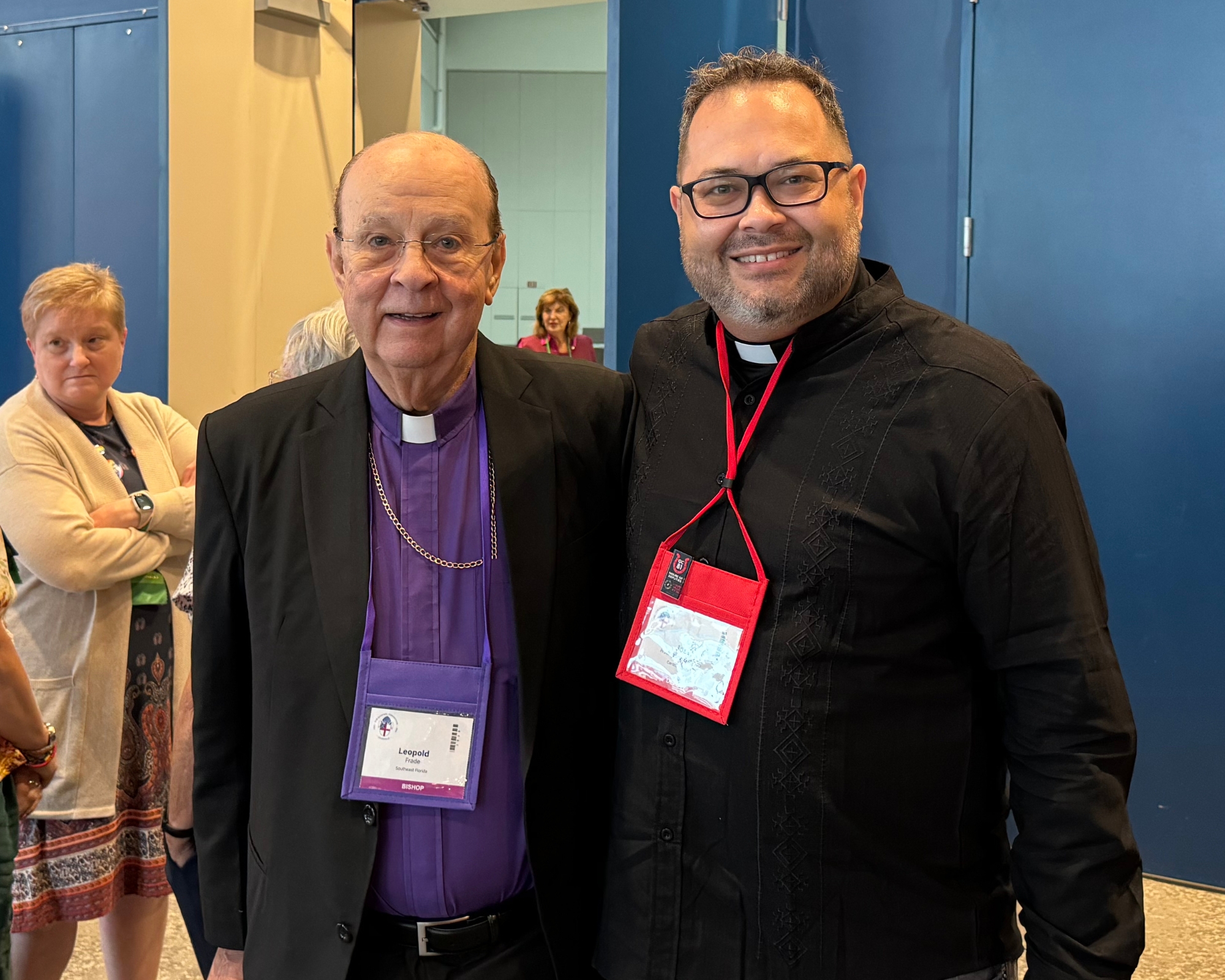
Bishop Leo Frade (L) with Rev. José Rodríguez | Photo: Courtesy GC81 DCF deputation
Many in the Diocese of Central Florida have connections to Puerto Rico, and Holcombe pointed out two items of significance for our friends and neighbors there. “I was pleased to learn that this is the first General Convention where lay and clergy deputies from Puerto Rico were given seat, voice and vote,” he said, adding that “Father José Rodríguez was able to put forward a motion that would help deputies from Province IX secure visas in an easier way than they currently do so that they can attend General Convention.”
Mental health is also a great concern to many in the Diocese of Central Florida, and Miller had the opportunity to serve on the floor the afternoon the House of Deputies considered Resolution A079, “Mental Health Sunday.”
He said this resolution was “significant” because it “would designate one Sunday in October to mental health awareness and, by this resolution, the church would provide liturgical materials and educational resources to help the church understand mental health. … now we have a Mental Health Sunday, and material will be available for use any time of the year.”
Members of the diocesan deputation had no better example of the potential impact of their service than the June 25 reading of Resolution A179, honoring the late Krisita Anne Jackson, longtime member of St. John the Baptist, Orlando; of the Canon Nelson Pinder Chapter of the Union of Black Episcopalians; of the diocesan deputation; and of the Daughters of the King, which she served in various diocesan offices and as national president from 2018-2022. The resolution itself lists even more of her kingdom work.
“It was obvious that the Diocese of Central Florida takes its place in the councils of The Episcopal Church as one of our own was recognized today,” White said. “During the Resolutions of Privilege and Courtesy, A179 was read, which expressed gratitude for Krisita Jackson. While I did not know her personally, I saw her at Diocesan Conventions and knew of her work in Central Florida. It is clear her influence extended well beyond Florida and into the greater church. Coincidentally, during the reading of the resolution, rain poured and was loud on the Convention Center roof. As the reading ended, the rain slowed. Then there was a moment of silence for Krisita.”
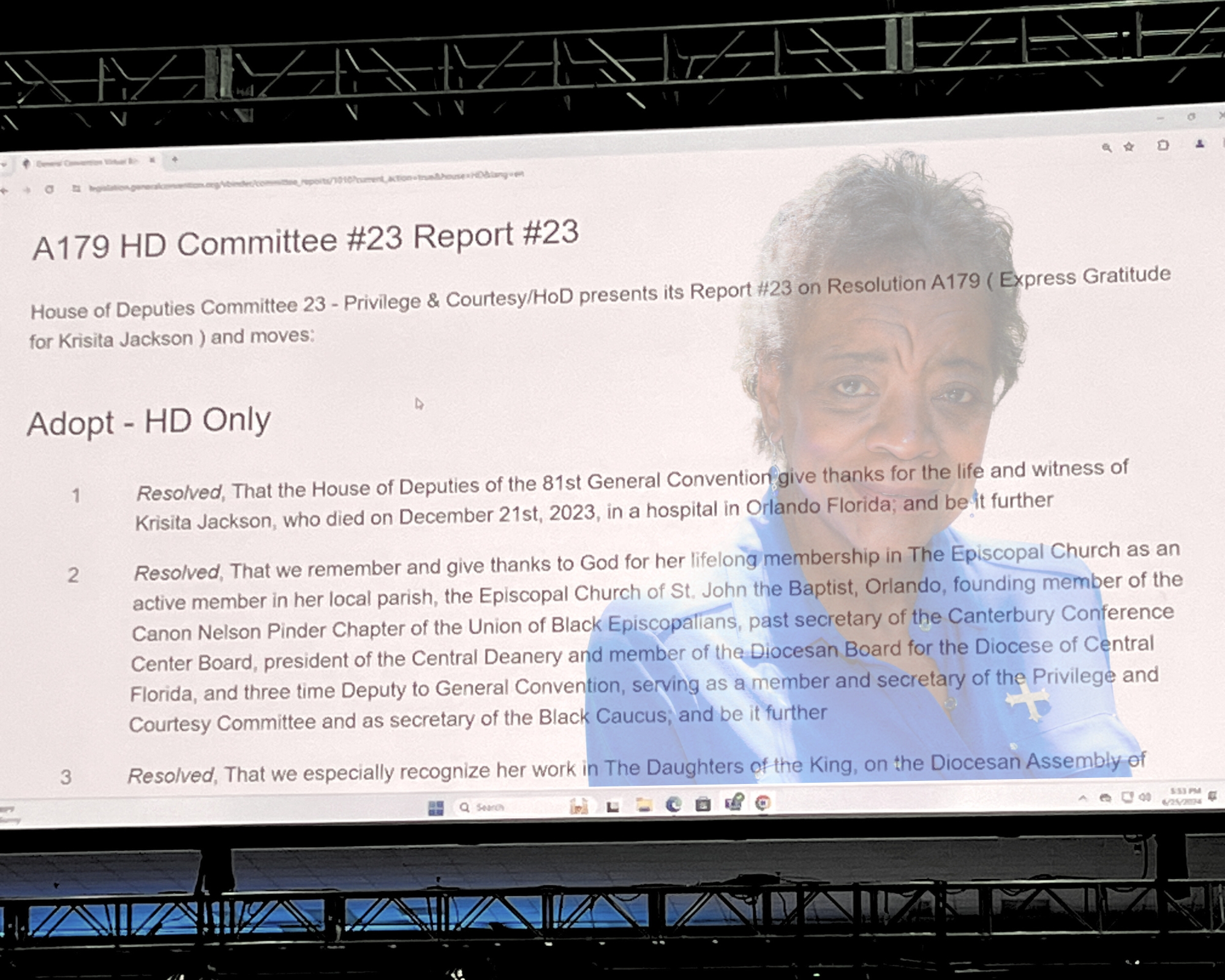
Resolution honoring Central Florida’s Krisita Jackson | Photo: Courtesy GC81 DCF deputation
“Getting to hear and see the impact Krisita Jackson had in so many ways in The Episcopal Church nationwide was powerful,” Cook said. “We know and got to experience the impact she had here locally within her community, but it was an honor to witness and recognize the impact she had nationwide.”
Fletcher agreed. “I hope we have more clergy and laity follow in her footsteps and take interest in national and international positions as Krisita did, with the vision of clarifying and promoting the gospel of Jesus Christ,” she said. “There are far too many Christians who use their platforms to promote personal agendas without care of how those agendas affect their brothers and sisters in Christ and seemingly without true discernment of the Lord’s will. To know that our own Krisita used her position to promote prayer, racial reconciliation and the gospel of Jesus humbles and inspires me to follow in her footsteps.”
Gratitude for GC81
Despite exhaustion from a packed schedule and the frustrations associated with a sometimes-tedious legislative process, bishops and deputies alike agreed on their gratitude for the overall experience of GC81.
“In addition to my primary responsibilities to minister as the chief pastor for the Diocese of Central Florida, I have had opportunities to serve in The Episcopal Church and the broader Anglican Communion,” Holcomb said. “Because of my experience at this General Convention, this line stands out to me from the examination in the service for the ordination of a bishop: ‘With your fellow bishops you will share in the leadership of the Church throughout the world’ (Book of Common Prayer, 517).
“It was a joy and honor to serve, pray, worship and be with so many bishops from around the Anglican Communion while serving at my third General Convention and my first in the House of Bishops,” he said.
Smith, with many years of experience in both The Episcopal Church and the House of Bishops, expressed equal enthusiasm. “I am a blessed man to serve in our wonderful church,” he said. “I didn’t know when I first said ‘yes’ to God how much God was going to say ‘yes’ to me.”
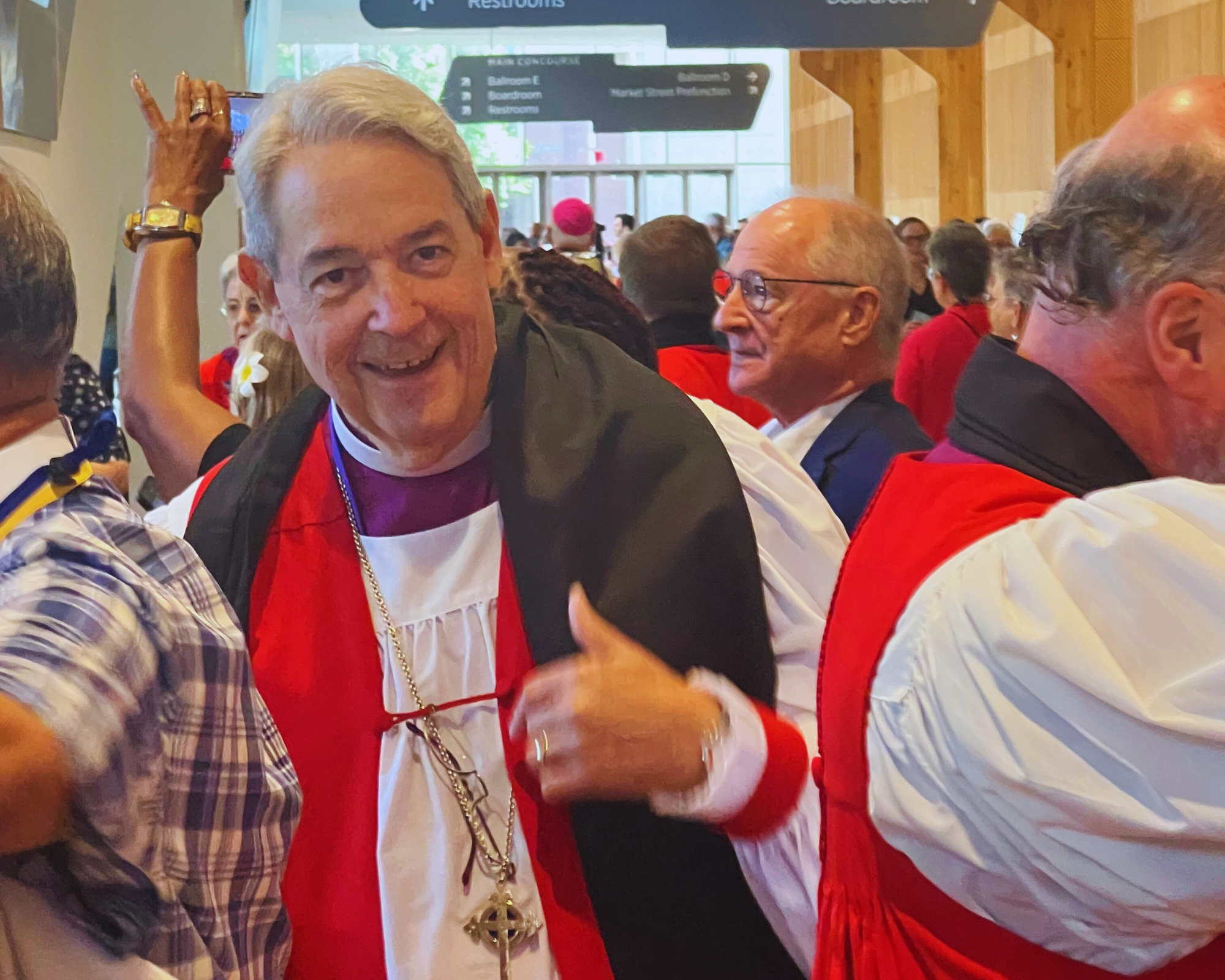
Diocese of Central Florida Assisting Bishop Dabney Smith | Photo: Courtesy GC81 DCF deputation
“This Convention has been unusually personal to me in seeing old friends I have served with finishing: like Michael Barlowe [General Convention’s executive officer, retiring in August] and Michael Curry … or continuing like Julia Harris … or newly elected like Sean Rowe,” Smith added. “I was a deputy when Edmund Browning [24th presiding bishop] completed his term and Frank Griswold [25th presiding bishop] was elected; an alternate when Katharine Jefferts Schori [26th presiding bishop] was elected; bishop when Michael Curry and Sean Rowe were elected. What a great journey!”
Bartle had similar thoughts. “It has been a joy and a privilege to serve our diocese for seven Conventions, although wearing a tag that indicated ‘Senior Deputy’ was a little unnerving,” she said. “I am not sure I know enough to merit this.”
Even as a first-time deputy, Oxley was also grateful for the opportunity to serve. “It has been a lot of work, but I have thoroughly enjoyed myself,” she said of her participation in GC81. “It has been a great experience!”
“One of the highlights of attending GC81 was getting to know and spending time with other folks from the Diocese of Central Florida,” Predmore said. “In case you are unaware, we have some pretty outstanding people!”
Cook expressed equal enthusiasm about her GC81 experience. “It’s been a delight to get to work with our deputation, with colleagues from around our diocese,” she said. “It’s obvious the amount of care from the deputies in our deputation, and it’s been a joy to see the camaraderie and coming together to make a difference. I’ve also seen a high level of care across the room. Deputies care very deeply about how we work on resolutions as well as how we word things to show the utmost level of care on behalf of The Episcopal Church.”
Mueller also remarked about the deputation’s unity and hard work. “As a team, we worked collaboratively all six days of legislative sessions – communicating, sharing the work load, and drawing upon one another’s strengths and skill sets,” she said. “As each day progressed, deeper friendships among us were forged, reliance and respect grew, and victories were celebrated. We shared concerns, compassion, encouragement, tears and laughter – praying for one another, with one another, and as a group assembled to take our place in the councils of the church, serving ‘together in love.'”
“Each day our chaplain, the Rev. Lester Mackenzie, opened with prayer, and most days, included Psalm 25:5, ‘Lead me in your truth and teach me, for you are the God of my salvation; for you I wait all the day long,'” Predmore said.
Of this passage and prayer, Miller said, “I think this is a great verse for the whole Convention, a prayer that I think many who participated in the process prayed from within.”
“The chaplain was also called on to pray with and for us when we had difficult decisions to make,” Predmore explained. “One word he always used was ‘gratitude.’ This is the word I will adopt to describe my experience at GC81.”
